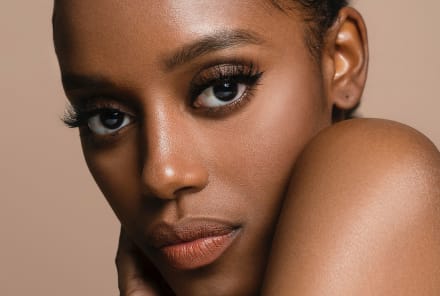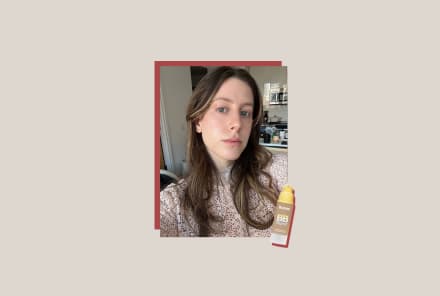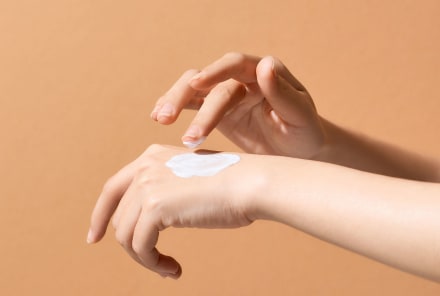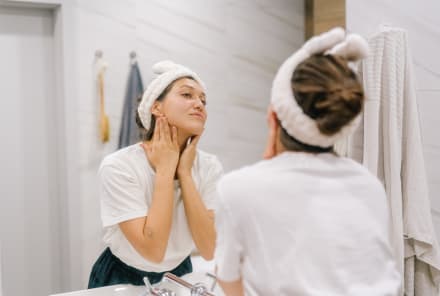Advertisement
Dandruff vs. Dry Scalp: Which Flakes Are You Dealing With + How To Treat Each


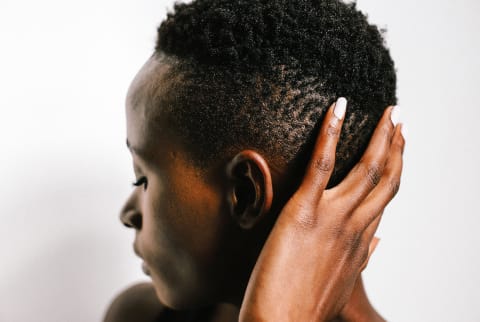
Do I have dandruff or dryness? It's a common question, as the two have overlapping symptoms (like flakes and itchiness), but it's also an important one—since you don't treat the two conditions in identical ways.
For example, if you believe you're facing some scalp dryness, you might lay on the moisturizing scalp masks and oil treatments. But if your issue is dandruff, well, applying more oil to the scalp may only increase the number of itchy scales. And vice versa: If you swap in a purifying, salicylic acid shampoo to mitigate dandruff symptoms, the flakes might just multiply if you're really dealing with a dry scalp. See the dilemma?
Fear not, for we asked derms exactly how to tell which condition you have. So the next time the flakes fall and you wonder, Is it dandruff or a dry scalp? you'll have your answer.
Dandruff.
Technically, dandruff is seborrheic dermatitis, a form of eczema, that's caused by a yeast called Malassezia furfur, board-certified dermatologist Raechele Cochran Gathers, M.D., tells us about the condition. These flares tend to happen for a multitude of reasons (read all about 'em here), but the most common triggers tend to be a change in weather—both cold and humid temperatures—as well as stress.
Dry scalp.
Scalp dryness, on the other hand, typically happens due to natural skin shedding when your scalp is in dire need of hydration (just like how the skin on your face may flake when it's parched). With a dry scalp, you may see symptoms such as tight skin, itchiness, flakes, ashiness, or redness—some of which (looking at you, itchiness and flakes), overlap with dandruff.
As far as triggers go, stripping cleansers and cold weather are common culprits, as are hormone and age fluctuations. Essentially: Anything that causes dry skin on your face and body also has the ability to zap your scalp of moisture.
How to tell the difference.
The question you came for: Do you have dandruff or a dry scalp? To determine the condition, you may want to take a closer look at the flakes themselves (gross but necessary): "Dandruff flakes tend to be large, individual scale-like flakes on the scalp or base of the hair," board-certified dermatologist Joshua Zeichner, M.D., once told us about how to I.D. your flakes. As for dryness? Those flakes look similar to traditional dandruff flecks, just a bit smaller and more white (dandruff can look a bit yellowish, especially if you have large, oily scales).
Board-certified dermatologist Iris Rubin, M.D., founder of SEEN Hair Care, recommends a little experiment to figure out which condition you truly have: "Try a clarifying shampoo, and if the flakes persist, it is more likely dandruff," she says. If you have any film of product, dead skin, oil, or dirt on your scalp, no moisturizing scalp mask or oil is going to penetrate those dehydrated skin cells—which can exacerbate dryness. So if you use a clarifying wash to lift all that buildup, subsequently hydrate the scalp, and still notice a dusting of flakes? There's a good chance you're dealing with dandruff.
What to do about each.
OK, so you have dandruff. Or you have a dry scalp. Neat. Now the next question becomes: What should you do about it?
For dandruff.
We'll start by saying that since it's a mild form of eczema, there's actually no "cure" for dandruff—but you can manage the symptoms (i.e., itchy flakes). Many experts point to OTC-medicated shampoos, which are formulated to decrease inflammation and help with scaling and itching.
"Ketoconazole, the active ingredient in Nizoral shampoo, is a popular antifungal that can help fix itchy scalp. Selenium sulfide shampoos also help to reduce buildup on your scalp and help cut the yeast that can trigger dandruff. Zinc pyrithione is antibacterial and antifungal and can help fix some types of itchy scalp," says Cochran Gathers.
Or you can go the natural route, with a shampoo that features salicylic acid. "(It helps to reduce scaling on the scalp," board-certified dermatologist Hadley King, M.D., tells us about dandruff treatments), tea tree oil (which has impressive antibacterial, antifungal, and anti-inflammatory properties1), or apple cider vinegar (its acidity helps rebalance the skin microbiome, which can cause the trouble-causing bacteria to stop multiplying).
For a dry scalp.
While those with dandruff might add a shampoo to their regimen, dry scalp sufferers might want to skip a shampoo or two—a parched scalp is frequently attributed to over-shampooing. And while you may want to use a clarifying number every so often to lift buildup, make sure you follow up with a hydrating conditioner or scalp mask to replenish the moisture (lest you wind up with an even drier scalp).
You may also want to apply scalp-specific oils, like jojoba oil: "Jojoba makes an excellent moisturizer for dryness since the active components of jojoba oil mimic the body's natural oils due to its waxy nature," notes naturopathic doctor Tess Marshall, N.D. Bonus points if you use it for a tension-relieving scalp massage, as these can promote blood circulation and pave the way for a healthy, supple scalp. "Use your finger pads (not nails) to apply medium-firm pressure to your scalp, in a circular motion," Cochran Gathers once advised us.
See here for our full guide to moisturizing your scalp.
The takeaway.
Dandruff and dryness make look similar at first glance, but they do have slight nuances: A dry scalp can produce small, white flakes, while dandruff scales tend to be larger and oilier, with a yellowish hue. You also don't want to treat them the same way, so it's important to identify which condition you're dealing with before loading up on remedies.

